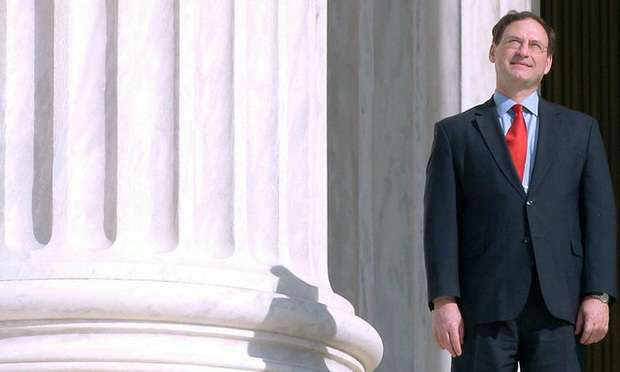Justice Thomas, Recruiting Liberal Wing, Leads Pro-Consumer Ruling Against Home Depot
The rare pro-consumer ruling in a class action was even more unusual because of the uncommon allies who joined Justice Clarence Thomas.
May 28, 2019 at 03:15 PM
4 minute read
 U.S. Supreme Court Justice Clarence Thomas. Credit: Diego M. Radzinschi / NLJ
U.S. Supreme Court Justice Clarence Thomas. Credit: Diego M. Radzinschi / NLJ
With Justice Clarence Thomas taking the lead, the U.S. Supreme Court on Tuesday made it more difficult for class action defendants to transfer their cases from plaintiff-friendly state courts to more business-friendly federal courts.
Thomas wrote the majority opinion in Home Depot USA v. Jackson, ruling that so-called third-party counterclaim defendants in class actions do not have the authority under the Class Action Fairness Act to transfer or remove their cases to federal courts.
The rare pro-consumer ruling in a class action was even more unusual because of the uncommon allies who joined Thomas: liberal Justices Ruth Bader Ginsburg, Stephen Breyer, Sonia Sotomayor and Elena Kagan. That lineup had not taken place in a 5-4 ruling since 2014.
The decision at bottom was a matter of dueling statutory interpretations. Justice Samuel Alito Jr., who often aligns with Thomas, wrote a stern dissent, asserting that the majority “has not one jot or tittle of analysis on the plain meaning” of “defendant” in the class action law, also stating that another part of the majority ruling “rests on a non sequitur.”
Paul Bland of Public Justice, who argued the case on behalf of Home Depot customer George Jackson, tweeted: “Huge win in U.S. Supreme Court! Court refused to make it easier for corporations scamming consumers to push cases to their favorite courts.”
In an interview with The National Law Journal before oral argument in January, Bland said that if Home Depot prevailed, “all of a sudden nearly every sizable personal injury case or products liability case would be easy to force in federal court and get out of state court.”
In 2016, Citibank filed a debt-collection action against Jackson for money he owed on a Home Depot credit card. Jackson filed a counterclaim for a putative class against Citibank, Home Depot and Carolina Water Systems Inc. Home Depot allegedly induced homeowners to buy expensive water treatment systems, which Jackson claimed violated North Carolina law.
Home Depot removed the case to federal court, but Jackson sued to remand it to state court because under the law “third-party/additional counter defendant like Home Depot” could not transfer class actions to federal court. The federal district court and U.S. Court of Appeals for the Fourth Circuit agreed with Jackson, prompting Home Depot to take the dispute to the Supreme Court.
Thomas said his reading of the statute led him to agree with the lower courts in Jackson's case.
“The limits Congress has imposed on removal show that it did not intend to allow all defendants an unqualified right to remove,” Thomas wrote. “The dissent argues that our interpretation allows defendants to use the statute as a 'tactic' to prevent removal … but that result is a consequence of the statute Congress wrote. Of course, if Congress shares the dissent's disapproval of certain litigation 'tactics, it certainly has the authority to amend the statute. But we do not.”
 Justice Samuel Alito Jr. Credit: Diego M. Radzinschi / ALM
Justice Samuel Alito Jr. Credit: Diego M. Radzinschi / ALMIn dissent, Alito said that under the majority's interpretation, “a defendant's routine attempt to collect a debt from a single consumer could be leveraged into an unremovable attack on the defendant's 'credit and lending policies' brought on behalf of a whole class of plaintiffs—all in the very state courts that CAFA was designed to help class-action defendants avoid.”
Alito's dissent was joined by Chief Justice Roberts and Justices Neil Gorsuch and Brett Kavanaugh.
The Supreme Court ruling in Home Depot v. Jackson is posted below:
Read more:
Home Depot Case Could Move 'Tons of Individual Cases' to Federal Court
Roberts Delivers Latest Pro-Arbitration Ruling for Divided Court
This content has been archived. It is available through our partners, LexisNexis® and Bloomberg Law.
To view this content, please continue to their sites.
Not a Lexis Subscriber?
Subscribe Now
Not a Bloomberg Law Subscriber?
Subscribe Now
NOT FOR REPRINT
© 2025 ALM Global, LLC, All Rights Reserved. Request academic re-use from www.copyright.com. All other uses, submit a request to [email protected]. For more information visit Asset & Logo Licensing.
You Might Like
View All
4th Circuit Upholds Virginia Law Restricting Online Court Records Access
3 minute read
Supreme Court Considers Reviving Lawsuit Over Fatal Traffic Stop Shooting

Is 1st Circuit the New Center for Trump Policy Challenges?

Insurance Policies Don’t Cover Home Depot's Data Breach Costs, 6th Circuit Says
Trending Stories
- 1Corporate Litigator Joins BakerHostetler From Fish & Richardson
- 2E-Discovery Provider Casepoint Merges With Government Software Company OPEXUS
- 3How I Made Partner: 'Focus on Being the Best Advocate for Clients,' Says Lauren Reichardt of Cooley
- 4People in the News—Jan. 27, 2025—Barley Snyder
- 5UK Firm Womble Bond to Roll Out AI Tool Across Whole Firm
Who Got The Work
J. Brugh Lower of Gibbons has entered an appearance for industrial equipment supplier Devco Corporation in a pending trademark infringement lawsuit. The suit, accusing the defendant of selling knock-off Graco products, was filed Dec. 18 in New Jersey District Court by Rivkin Radler on behalf of Graco Inc. and Graco Minnesota. The case, assigned to U.S. District Judge Zahid N. Quraishi, is 3:24-cv-11294, Graco Inc. et al v. Devco Corporation.
Who Got The Work
Rebecca Maller-Stein and Kent A. Yalowitz of Arnold & Porter Kaye Scholer have entered their appearances for Hanaco Venture Capital and its executives, Lior Prosor and David Frankel, in a pending securities lawsuit. The action, filed on Dec. 24 in New York Southern District Court by Zell, Aron & Co. on behalf of Goldeneye Advisors, accuses the defendants of negligently and fraudulently managing the plaintiff's $1 million investment. The case, assigned to U.S. District Judge Vernon S. Broderick, is 1:24-cv-09918, Goldeneye Advisors, LLC v. Hanaco Venture Capital, Ltd. et al.
Who Got The Work
Attorneys from A&O Shearman has stepped in as defense counsel for Toronto-Dominion Bank and other defendants in a pending securities class action. The suit, filed Dec. 11 in New York Southern District Court by Bleichmar Fonti & Auld, accuses the defendants of concealing the bank's 'pervasive' deficiencies in regards to its compliance with the Bank Secrecy Act and the quality of its anti-money laundering controls. The case, assigned to U.S. District Judge Arun Subramanian, is 1:24-cv-09445, Gonzalez v. The Toronto-Dominion Bank et al.
Who Got The Work
Crown Castle International, a Pennsylvania company providing shared communications infrastructure, has turned to Luke D. Wolf of Gordon Rees Scully Mansukhani to fend off a pending breach-of-contract lawsuit. The court action, filed Nov. 25 in Michigan Eastern District Court by Hooper Hathaway PC on behalf of The Town Residences LLC, accuses Crown Castle of failing to transfer approximately $30,000 in utility payments from T-Mobile in breach of a roof-top lease and assignment agreement. The case, assigned to U.S. District Judge Susan K. Declercq, is 2:24-cv-13131, The Town Residences LLC v. T-Mobile US, Inc. et al.
Who Got The Work
Wilfred P. Coronato and Daniel M. Schwartz of McCarter & English have stepped in as defense counsel to Electrolux Home Products Inc. in a pending product liability lawsuit. The court action, filed Nov. 26 in New York Eastern District Court by Poulos Lopiccolo PC and Nagel Rice LLP on behalf of David Stern, alleges that the defendant's refrigerators’ drawers and shelving repeatedly break and fall apart within months after purchase. The case, assigned to U.S. District Judge Joan M. Azrack, is 2:24-cv-08204, Stern v. Electrolux Home Products, Inc.
Featured Firms
Law Offices of Gary Martin Hays & Associates, P.C.
(470) 294-1674
Law Offices of Mark E. Salomone
(857) 444-6468
Smith & Hassler
(713) 739-1250








